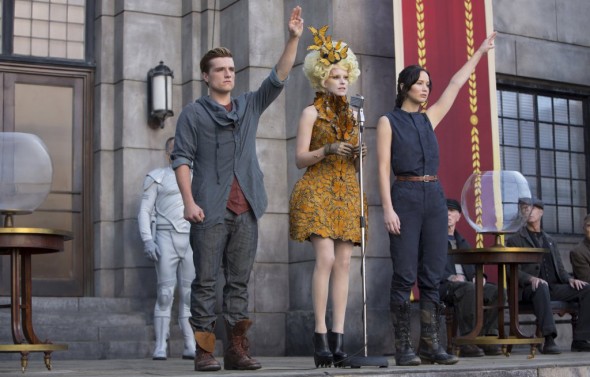The reality of inequality is actually far worse than depicted in the movies and books. Courtesy of Lionsgate
Tributes and Patients
In Suzanne Collins wonderful series we are presented with a grim depiction of a future world.
A world in which people are selected randomly to become participants in a game:
A Hunger Game
One in which 24 people must fight to the death. Set in an exotic arena with the goal of using “augmented natural selection” to crown a lone survivor.
In the book these randomly selected participants become "tributes". They are reminders of a society that existed 75 years ago when the poor and downtrodden took a stand against “The Capital”. A cautionary tale of those trapped between the hardship of war, starvation and grave inequality.
Thirteen districts represent different levels, divided into casts and only those in the capital have access to a higher standard of living. A standard sustained by the industrial products of the working poor.
The Right to Survive
The most basic human right - the right so survive is trampled upon in an age of great affluence.
It reasons that the matter should be considered the most pressing of our times.
It's not much of a stretch to argue that anyone who wishes to be considered humane has ample cause to consider what it means to be sick and poor in the era of globalization and scientific advancement.
Yet in the United States, in this most modern, "Christian", globalized society we have built an arena. A capital composed of a greedy minority, one that seems content to draw names from a hat and watch with apathy as the most vulnerable are sent to their premature deaths.
Those in the capital, separated from the districts are for the most part unaware of the conditions that exist beyond their heavily gated community. Ignorance seems a reasonable explanation, but it should not be forgiven in lieu of a growing acceptance of the Hunger Games.
Building the Arena
Increasingly I am seeing corporations create workarounds to limit healthcare for their employees. Dole Foods for example a well-known fortune 500 company with 2010 revenues of $6.9 billion is “the world's largest producer and marketer of high-quality fresh fruit and fresh vegetables”. Operating in more than 90 countries employs an average of 36,000 full-time regular employees, and 23,000 full-time seasonal or temporary employees worldwide.
They have recently implemented a monthly renewable healthcare policy for their employees, a policy that requires all employees to work the first day of the month to qualify for coverage for that month. Since the implementation of this policy just two months ago I have watched 6 patients of mine lose their healthcare coverage while on disability for a medical illness. Yes, they lost their medical insurance when they needed it the most, all poor, all without viable alternatives.
And this is just the beginning.
Patients as Tributes
We create tributes as the minority of great affluence tolerates a system that would withdrawal medical coverage while fighting a battle with breast cancer, deny the elderly much needed healthcare at a stage in life when it is needed the most, refuse treatment without an appropriate copay or identification card, charge four months wage for an emergency room visit.
We trample upon the most basic of human rights.
We create tributes in a “healthcare games”.
The fact that the arena exists is testament that as Americans we have “retained a silence closely resembling stupidity”. We speak of democracy, but it is a lazy democracy.
It always starts with small injustices that once accepted creep into society. During times of recession these injustices are easier to tolerate, there is a line of unemployed eager to take the job of every Dole employee, and a corporation who obviously cares very little about their employees.
As I mentioned before the most basic human right - the right so survive is trampled in an age of great affluence.
It is easy for corporate America to turn a blind eye, but it is in my humble opinion that we as healthcare providers should be held to a higher standard.
















Leave a Reply